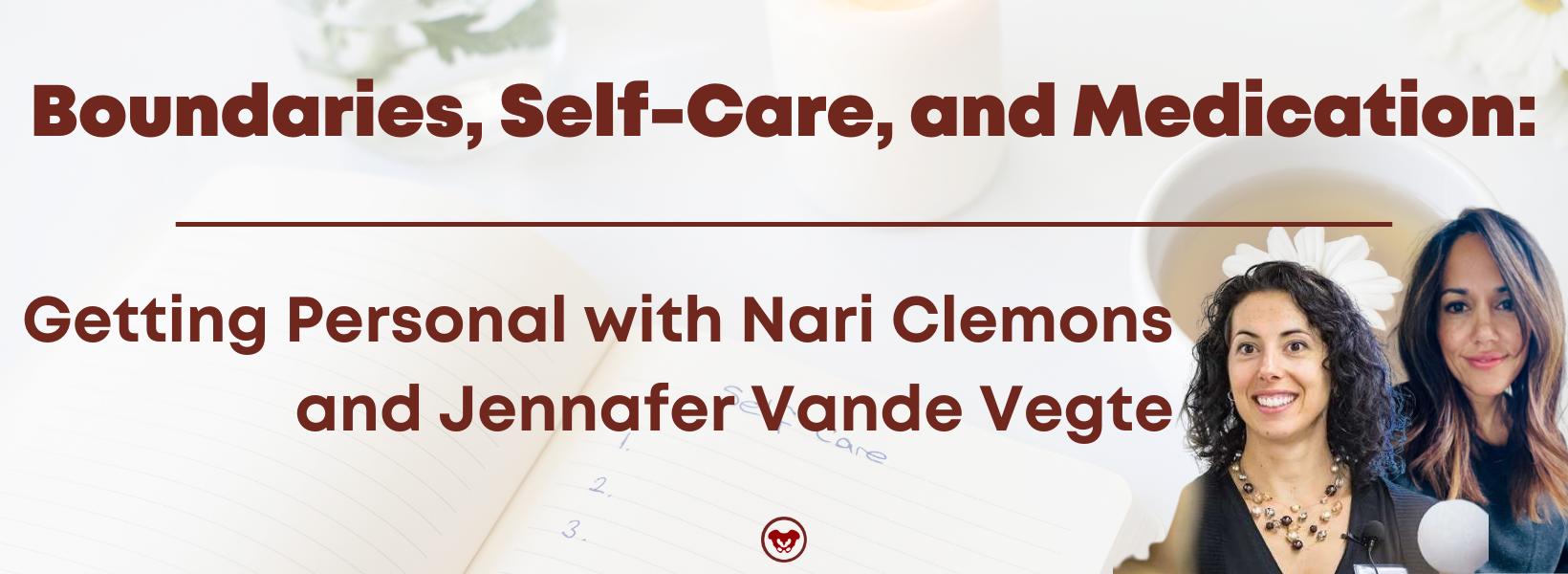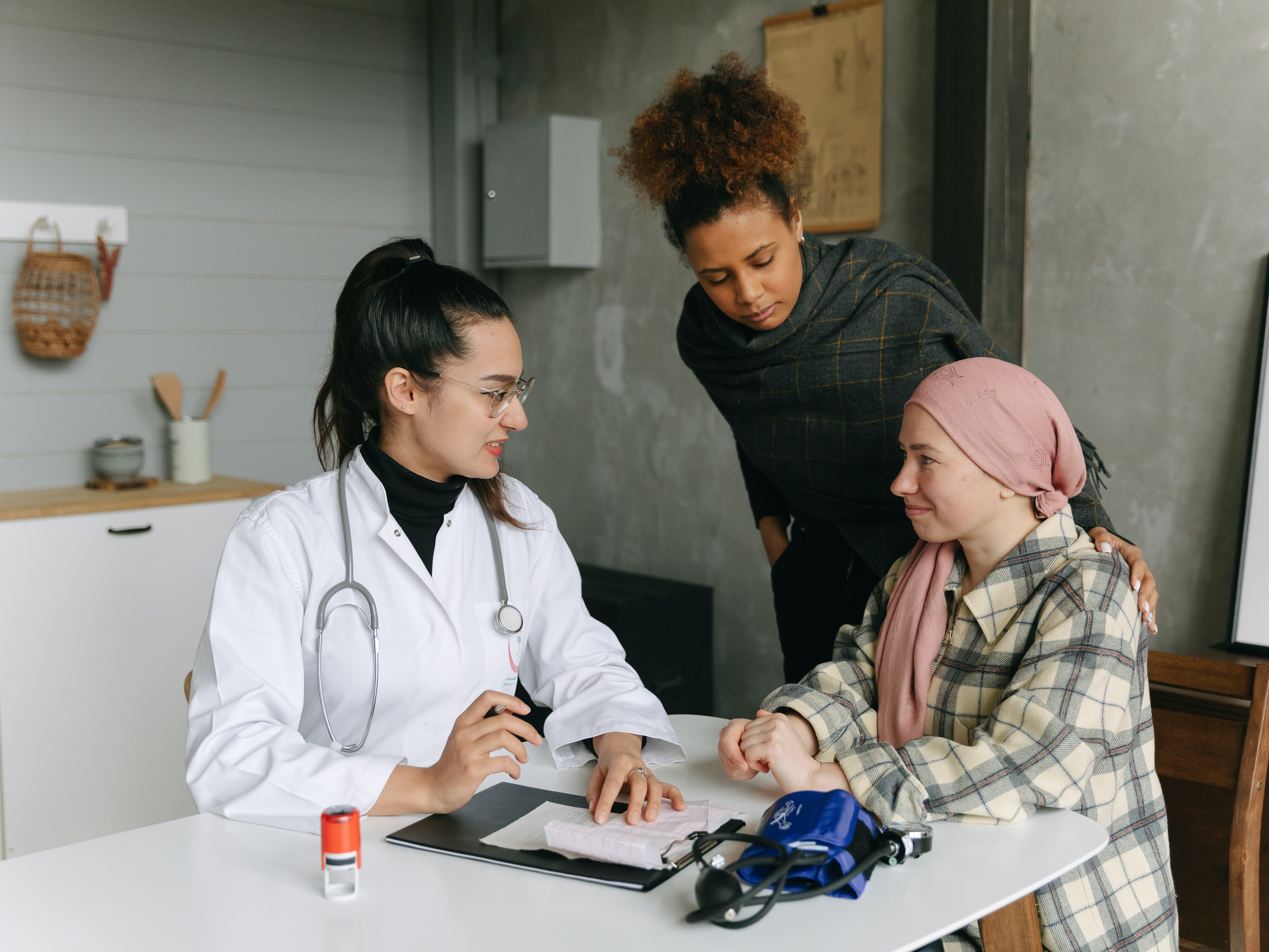Boundaries, Self-Care, and Meditation: Getting Personal with Nari Clemons and Jennafer Vande Vegte

Nari Clemons - Actually, I used to have a meditation and neuroscience class for Herman Wallace. It was a shorter class. But, I felt it was lacking in tools for the provider. For example, as an empathic provider, I felt I was very aware, very mindful that I was losing energy, that I was "picking things up" from my patients, and that I was really not enjoying my job or life balance as much as I used to. I became ill and burnt out, working in this intensive field. It felt like the joy of my life was kind of being sucked up by my job. Jen and I launched our own journeys, together, trying to understand how this world of boundaries and balance could help us in our own lives. So much changed and grew from that. So, in time we decided to combine the two into one class, to help practitioners integrate meditation into their practice and life, but also how to come back to loving their jobs with balance, as we were able to.
What are the top 3 takeaways a practitioner could hope to gain from this class?
NC - 1. Better self-care in and out of the clinic. 2. A more effective and less taxing way to interact with clients, share responsibility, and communicate in more helpful ways for both practitioner and patient. 3. enjoying their life and having more energy for their life outside of work.
JVV - 1. You don’t have to do it all. 2. We want to support you with tools to help your patients take more responsibility for their care and their outcomes. 3. YOU ARE VALUABLE…and here are ways you can care for yourself, have healthy boundaries, and align your actions with your priorities so you can leave work at work and truly enjoy your life outside of work.
Who do you think needs to take this class?
NC - Any practitioner who is finding work more and more emotionally taxing or draining. Really, there are a few patterns that benefit from this class. People who over-give and over-function in relationships in their life, including patient relationships. Often there can be a bit of a people-pleasing tendency in these situations. Also and especially if a participant is one of those people who have always been a little sensitive to energy: feel things, pick up things, notice their energy changes when they interact with others. I feel like this is the only class I know of that specifically gives tools and strategies for this kind of provider.
JVV - EVERYONE! LOL. People who are wrestling with healthy work/life balance, who find themselves staying late after work or working through lunch, health care providers who tend to care more for their patients than they do for themselves, those of us who leave work drained and only have meager offerings of energy for our families.
What was your favorite feedback from participants in taking this class?
NC - We hear a lot from participants that other classes made them have better clinical skills, but this class has helped them to enjoy their own life and their job more and to feel more balanced and professional as they employ better boundaries and shared responsibility.
JVV - Ahhh, it is true joy when participants are empowered and equipped to set healthy boundaries, care for themselves, and feel more joy in their lives.
How is this class different from other classes through H&W?
NC - Kind of along the same lines, this class does give you skills for use with patients, but they are the skills that help your life feel better, and your job feels better. They give you permission to change your paradigm of treatment from "how much can I possibly give" to "how do I shift my job, self, and communication, to allow my job to be just one part of my life that is enjoyable and doesn't take so much energy away from the other parts of my life."
JVV - This is the only class that focuses both on skills to use for patients and skills to use FOR YOURSELF. To keep yourself healthy, balanced, and whole as a medical provider in a demanding, challenging role.
Why are there two parts to this class?
NC - Because it is a lot of information, a lot of life changes to integrate. It takes time. We like the idea of a month of growth and change. Participants do pre-work to prepare for the first weekend, which starts the process of change. Then, they do work in the following month and really work on the intensive integration, new habits, new patterns, and new neuronal networks. Then, we come back for another day for the second part of learning that participants will be ready for after integrating some of the basics of the first weekend.
JVV - We just had SO MUCH we wanted to share!! And we found having two classes spaced a month or so apart really lets participants ingest and apply one level of change before being ready and hungry for the next level. The first part focuses on establishing good boundaries with patients, self-care practices including meditation, and identifying areas of their lives that need support or intervention to be healthier. The second class dives deeper into thoughts, emotions, and actions. Practices like gratitude, visualization, and deeper mediation practices.
Boundaries, Self-Care, and Meditation - Part 1

Course Dates: March 18
Price: $400
Experience Level: Intermediate
Contact Hours: 12.5
Description: The instructors recommend completing this series in two parts to allow time to process and implement one leg of the journey before undertaking the next. Both Part One and Part Two have a significant amount of pre-work to digest and practice before meeting via Zoom. Please plan for up to 12 hours of pre-course work. This sets the stage for you to find your path to experiencing more joy, energy and balance.
In Part One, participants begin their process of study, meditation, and self-reflection in the weeks prior to the start of the class. Pre-work includes focus on the neuroscience of pain trauma, PTSD, and meditation. Participants will learn about the powerful influence both negative and positive experiences have on our nervous system’s structure and function. Personal meditation practice and instruction will create changes in the participant's own nervous system. Participants will also learn how to prescribe meditation for various patient personalities and needs, as well as analyze yourself through inventories on coping, self-care, empathy, burnout, values, as well as track how you spend your time. Commitment to pre-work will facilitate rich discussion as we put what you have learned into practice around building a shared responsibility model of patient care, language to support difficult patients, and both visualizing and planning steps to create new, healthier patterns in your life and in your practice.
By accepting you will be accessing a service provided by a third-party external to https://hermanwallace.com/



































